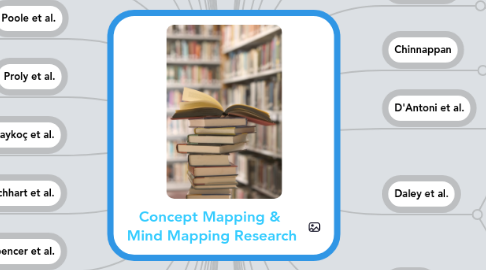Concept Mapping & Mind Mapping Research
par Toni Krasnic


1. Ahlberg et al.
1.1. Practical methods and techniques of knowledge representation in particular those related to concept mapping and mind mapping (2008)
1.2. Varieties of Concept Mapping (2004)
2. Al-Jarf
2.1. Enhancing freshman students’ writing skills with a mind mapping software (2009)
3. Anokhin
3.1. The forming of natural and artificial intelligence (1973)
4. Balim et al.
4.1. Examples of activities prepared by the technologically-supported mind mapping and concept mapping techniques, which are based on the constructivist approach (2008)
5. Beel
5.1. Docear- An Academic Literature Suite for Searching, Organizing and Creating Academic Literature (2011)
5.2. An Exploratory Analysis of Mind Maps (2011)
5.3. Enhancing Information Search by Utilizing Mind Maps (2010)
5.4. Information Retrieval on Mind Maps – What could it be good for (2009)
6. Berry et al.
6.1. Improving Learning through Interventions of Student-Generated Questions and Concept Maps (2008)
7. Brian et al.
7.1. How Do Preservice Teachers Use Concept Maps To Organize Their Curriculum Content Knowledge (1998)
8. Cain
8.1. Using mind maps to raise standards in literacy, improve confidence and encourage positive attitudes towards learning (2002)
9. Canas et al.
9.1. A Summary of Literature Pertaining to the Use of Concept Mapping Techniques and Technologies for Education and Performance Support (2003)
10. Chinnappan
10.1. ICT and pre-service teachers' content knowledge (2003)
11. D'Antoni et al.
11.1. Interrater reliability of the mind map assessment rubric in a cohort of medical students (2009)
12. Daley et al.
12.1. Using Concept Maps in Qualitative Research (2004)
12.2. Integrative Literature Review: Concept Mapping: A Strategy to Support the Development of Practice, Research, and Theory Within Human Resource Development (2010)
13. Davies
13.1. Concept Mapping, Mind Mapping and Argument Mapping: What are the Differences and Do They Matter? (2011)
14. Ellozy et al.
14.1. Making Learning Visible: Using E-maps to Enhance Critical Reading Skills (2010)
15. Evrekli et al.
15.1. Mind mapping applications in special teaching methods courses for science teacher candidates and teacher candidates’ opinions concerning the applications (2009)
15.2. Development of a Scoring System to Assess Mind Maps (2009)
16. Fonseca
16.1. Concept Maps as Tools for Scientific Research in Microbiology (2008)
17. Goodnough et al.
17.1. Mind mapping: A graphic organizer for the pedagogical toolbox (2002)
18. Hay et al.
18.1. Using concept mapping to measure learning quality (2008)
19. Henao-Calad
19.1. Concept maps as a strategy to convert knowledge in knowledge management (2007)
20. Holland et al.
20.1. An investigation into the concept of mind mapping and the use of mind mapping software to support and improve student academic performance (2004)
21. Institute for the Advancement of Research in Education (IARE)
21.1. Graphic Organizers: A Review of Scientifically Based Research (2003)
22. Karpicke et al.
22.1. Retrieval practice produces more learning than elaborative studying with concept mapping (2011)
22.1.1. Mintzes et al.: Comment on Karpicke et al. study
22.1.2. Karpicke et al. response to comment
